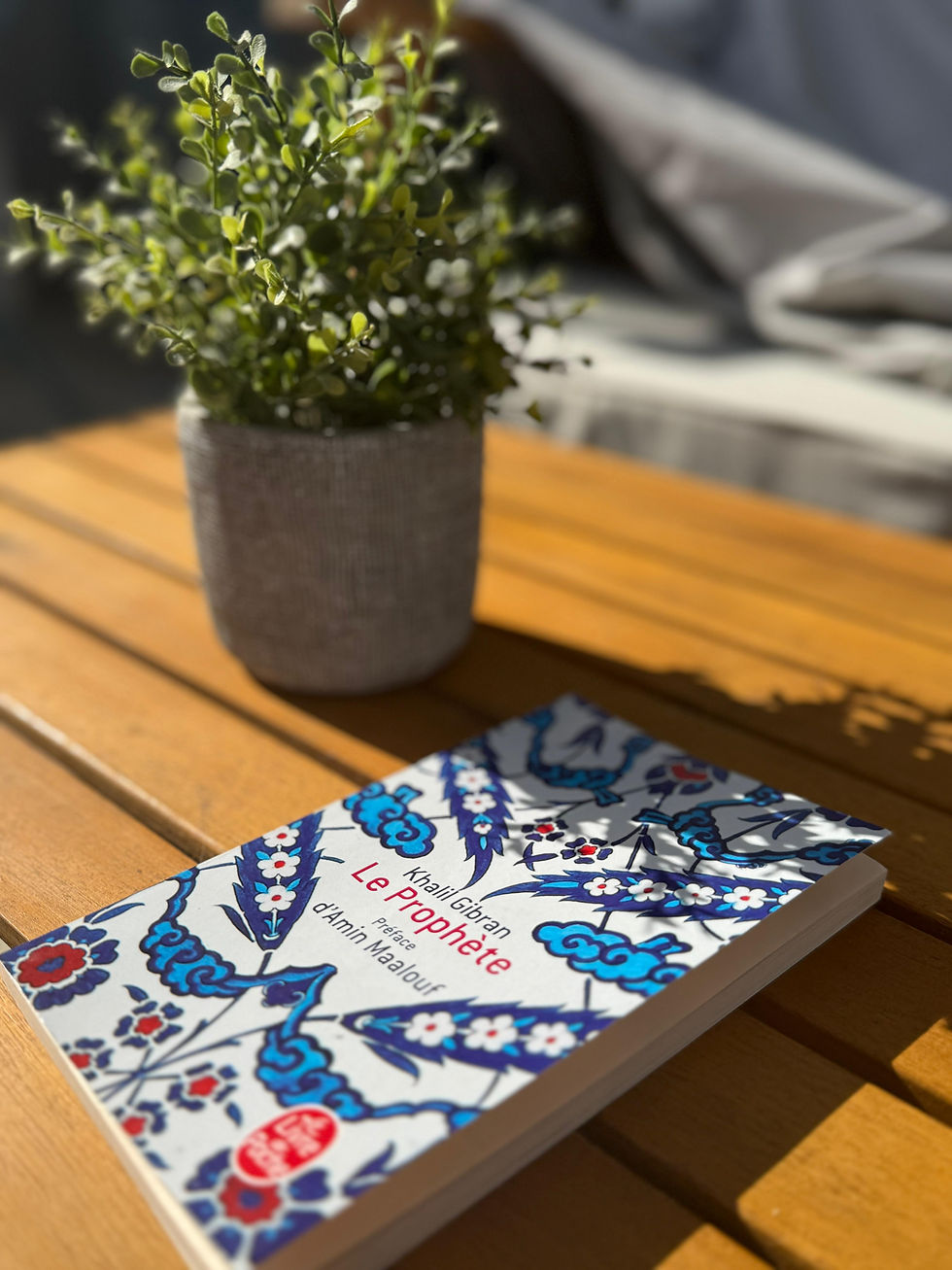What "The Prophet" can teach us about leadership today
- Marie-Josée

- Jul 21, 2025
- 4 min read
When The Prophet was published in 1923, it became an instant literary success. Through poetic meditations on themes such as love, work, freedom, and giving, Khalil Gibran offered more than a book, he offered a timeless guide to navigating life’s complexities. A century later, his insights continue to resonate, including in a context Gibran never explicitly addressed: leadership.

In brief, lyrical chapters, Gibran explores universal truths that continue to resonate across cultures and generations. In the preface to the French edition, writer and academic Amin Maalouf called The Prophet « a voice that transcends time and culture ». Today, that voice also speaks, perhaps more clearly than ever, to the way we think about work, purpose, and how we lead.
You won’t find talk of KPIs or management frameworks in Gibran’s pages. And yet, his reflections are strikingly aligned with the needs of today’s workplace. In a world defined by speed and complexity, The Prophet offers something rare: an invitation to pause, reflect, and realign our professional lives around what truly matters.
Purposeful leadership: the invisible driver of impact
The Prophet opens with a departure. Almustafa, the central figure, prepares to leave the city where he has lived in quiet observation for twelve years. Before he departs, the townspeople ask him to share his final thoughts on life’s essential questions - including work. He replies simply:
« Work is love made visible »
That one line has echoed far beyond the literary world. Hubert Joly, former CEO of Best Buy and author of The Heart of Business, quotes it to articulate his vision of human-centered leadership. For Joly, work is not just about productivity, it is about care, service, and meaning.
Both Gibran and Joly remind us that what we do matters, but how and why we do it matters just as much. In this light, leadership is not only about delivering results; it’s about creating spaces where people can connect their efforts to something meaningful, take ownership, and grow.
In fast-paced, target-driven workplaces, this perspective is easy to lose. Gibran’s words call us back to intention: reminding us that behind every project, process, or result lies the deeper question of purpose. Whatever our role, how we build matters as much as what we build.
Nurture individuality: The strength of difference
In one of the book’s most quoted passages on love and togetherness, Gibran writes:
« Fill each other’s cup but drink not from one cup. Sing and dance together and be joyous, but let each one of you be alone. Even as the strings of a lute are alone though they quiver with the same music »
Rather than calling for sameness, these lines point to a deeper harmony, one built on mutual respect and personal space. They remind us that unity doesn't mean uniformity. In the context of leadership and teamwork, this perspective is especially resonant.
As leadership advisor Samuel Knight puts it, « Partnership isn’t about losing ourselves in others, but standing independently while moving toward shared goals. »
Inclusive leadership draws strength from this balance. It’s not about shaping everyone into the same mold. It’s about recognizing and amplifying diverse strengths, perspectives, and voices. When individuals feel safe to bring their whole selves to work, collaboration thrives. Difference becomes a catalyst for creativity and collective progress.
Lead with empathy: the quiet strength of giving
Another timeless insight from Gibran speaks directly to the human side of leadership:
« You give but little when you give of your possessions. It is when you give of yourself that you truly give »
Here, generosity is redefined - not as transaction, but as presence. True giving, Gibran implies, lies in how we show up: with sincerity, humility, and emotional awareness. It’s about listening deeply, noticing what others need, and responding with care.
This is especially relevant in today’s work environments, where trust and psychological safety are essential. Whether guiding a team, mentoring a colleague, or supporting change, the most meaningful leadership often shows up quietly, through presence, humility, and empathy.
As we highlight in our blog Unlocking the Power of Emotional Intelligence, skills like empathy, active listening, and compassion are not « soft skills ». They are core capabilities for building resilient, engaged teams. When people feel seen and respected, they don’t just perform, they invest, collaborate, and grow.
Gibran reminds us that impact isn’t just about what we accomplish, it’s about how we treat people along the way.
Final thoughts: A human-centered approach to progress
Gibran doesn’t lay out management models or tactical solutions. Instead, he invites us to see leadership through a different lens, one grounded in presence, purpose, and human connection. In his vision, leadership isn’t defined by control, but by the ability to promote trust. It’s not measured by metrics alone, but by the meaning we create. It’s not about power, it’s about people.
In a time shaped by constant change and growing complexity, The Prophet offers a timely reminder: leadership is, above all, a human act. And the way we work - together - matters as much as the outcomes we pursue.
At NETO Innovation, this vision resonates deeply. We believe that true progress happens when strategy and technology are guided by human values. Innovation, for us, isn’t just about solving problems. It’s about serving real needs, creating meaning, and building what truly matters.
If you’re interested in more reflections on leadership, emotional intelligence, and purpose-driven innovation, subscribe to the NETO Innovation website. You can also follow us on LinkedIn for thoughtful insights, practical tools, and book recommendations to support your journey.




Comments